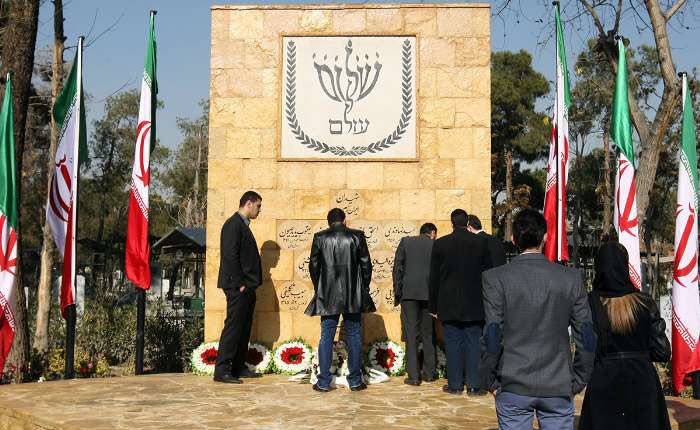December 26-2014

The Islamic Republic has unveiled a memorial to the Jewish soldiers who died fighting for Iran in the 1980-88 war against Iraq.
The memorial in Tehran appeared to be part of the ongoing effort by the Rohani Administration to show that religious and ethnic minorities have a respected place in the society of the Islamic Republic.
Though many in the West see the Islamic Republic as anti-Semitic, the regime has always been careful to distinguish between the Jewish faith and Zionism. There is a reserved seat for a representative of the Jewish community in the Majlis. And there is reserved rhetoric of hatred for the “Zionist regime” in Israel.
Because of Western criticism of the Islamic Republic as anti-Semitic, the regime has always sought to counter that, because it is seen as a slur on Iranian culture. Even President Ahmadi-nejad, who was the most vocal of Iran’s presidents assailing Israel, made a point of meeting publicly with Jews.
Rohani, however, has gone further and taken a large number of initiatives to show that Jews have a respected role in Iran.
The memorial to Jewish soldiers who died in the war is the latest. It was unveiled last Monday with inscriptions in both Farsi and Hebrew hailing the dead as “martyrs,” the highest honor bestowed by the Islamic regime.
The memorial is noteworthy because government records show only 11 of the 200,000 war dead were Jews. Its records show six of the war dead were Zoroastrians and 72 were Christians. There has been no talk of a Christian war memorial, however.
Since Rohani took office last year, Jews said they have been heartened by the support they’ve received. Rohani’s government agreed to allow Jewish schools to be closed on Saturdays, the Jewish Sabbath, probably the most important concession to the Jewish community. Rohani also allocated the equivalent of $400,000 to a Jewish charity hospital in Tehran and invited the Jewish deputy in the Majlis to accompany him in 2013 to the United Nations General Assembly in New York.
“We were fearful in the ’80s. We were feeling the pressure. Now, we are not concerned anymore. We feel secure and enjoy freedoms,” said Mahvash Kohan, a Jewish women from Shiraz. Tehran and Shiraz are the main centers of Jews in Iran.
“In the past,” she said, “Israel and others were providing incentives such as housing that lured some Jews. Now, it’s not like that. And Iranian Jews have better living and working conditions in Iran. So, no one is willing to leave now.”
There were believed to be more than 100,000 Jews in Iran at the end of World War II. Many went to Isarel in the 1950s, but the emigration slowed until the revolution, when it ramped up again. The last Iranian census found only 9,000 Jews, though the Jewish community thinks there are more than 20,000.
Of the Iranian Jews who emigrated, about half are thought to have gone to Israel and half to the United States.
At the dedication of the Jewish war memorial last Monday, the principal speaker from the regime was Mohammad Hassan Abu-Torabi-fard, the deputy speaker of the Majlis. He made clear the establishment perspective on Iranian Jews:
“The explicit stances of the Jewish community in supporting the Islamic Republic’s establishment and their obedience to the Supreme Leader of the Revolution demonstrate the bonds originating from the teachings of the divine religions.”